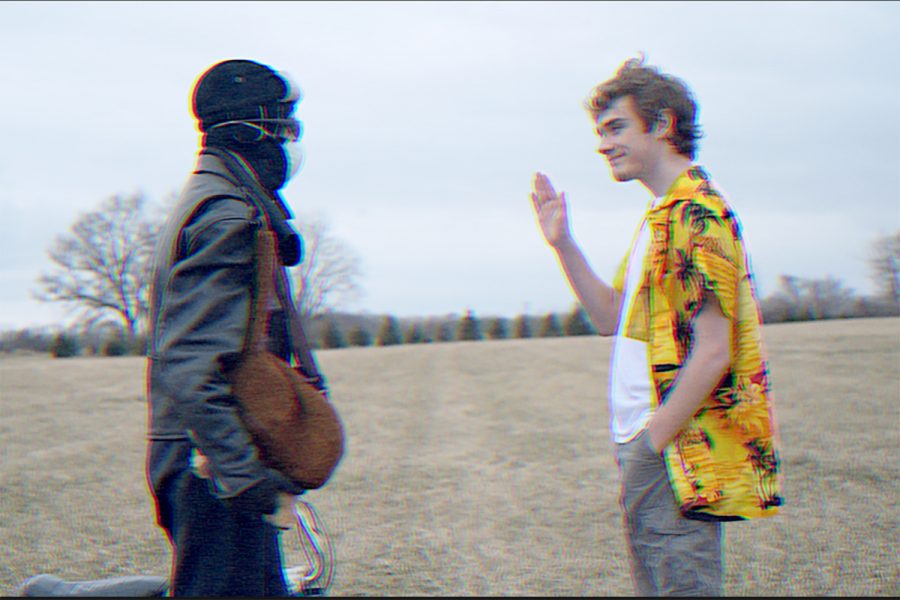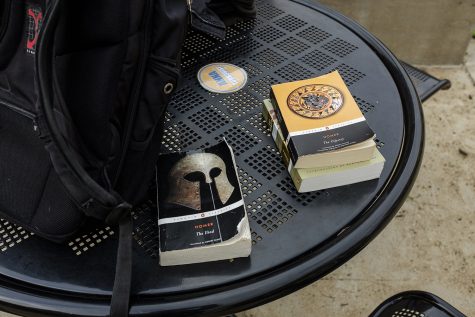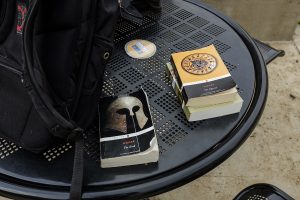Film students find new ways to keep the art of cinema alive while social distancing
While social distancing has made collaborative artwork difficult, three UI film students remain inspired to experiment with new ways of filmmaking.
April 29, 2020
While closures and lockdown measures due to COVID-19 have made collaborative artistic projects difficult for University of Iowa students, first year cinema major Dalton Bantz has only become more motivated to dive into his creative pursuits.
Bantz is currently working on an episodic mini-series featured on his YouTube channel. The mini-series, inspired by current events and titled “Pandemic Sam,” follows the title character Sam and his dog, Lucy, who live isolated in a tent during an unnamed pandemic.
“While it is unfortunate that students aren’t getting the college experience they signed up for, I can’t argue with the fact that the flexibility afforded by not requiring students to meet in person has allowed me to spend tons of time brainstorming, writing, and filming,” Bantz said in an email to The Daily Iowan. “I’ve always found that the more bored you are, the more creative you get, so I think that the lack of places to go and things to do really only helps motivate me to make more stuff.”
The student filmmaker has already uploaded four episodes of this mini-series and said he is currently working on writing the fifth episode, which will serve as the series finale. Bantz has pooled many of his creative talents to create “Pandemic Sam”— he writes the scripts, acts in the lead role, and even composes the score. His production team consists of his two younger brothers, who handle the filming of the show.
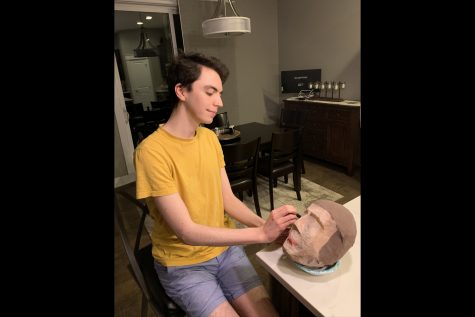
“It is the first time I have ever done something to that scale, and it’s certainly a project I never would have been able to explore without the transition to online classes and closures of residence halls,” Bantz said.
Luke Bonner, a third-year student majoring in English and cinema arts, said now is a great time for film students and filmmakers like himself to focus on other aspects of the filmmaking process, although it poses challenges to what creators can realistically accomplish collaboratively.
“I know some people are going back to edit old works and rejuvenate them, and others are building filming rigs at home,” Bonner said. “[Adapting to COVID-19 safety measures] has definitely made me think about my own film work much differently. I have so many ideas that have been reinvigorated and that I plan on getting to when it’s safe to do so again.”
UI cinema arts professors have had to adjust their syllabi to adapt to online learning, as many students are without the proper resources and equipment to continue with their film classes as usual. Lecturer and filmmaker Nellie Kluz said she has turned to experimental independent filmmakers to gain insight about how to scale down productions and work with limited resources in a smart and efficient way.
RELATED: UI M.F.A. art students find new ways to present theses amid COVID-19 closures
“[Independent filmmakers] are really scrappy and inventive with the kinds of films they make in their own houses or with very little money,” Kluz said. “I’m looking to a lot of those kinds of films for inspiration on what can be done.”
While there are many options for instructors and students working in digital film, like allowing students to film with smartphones, students like Bonner in analogue film classes said their classes have been more limited in their ability to adapt to distance learning, as they are more dependent on the equipment and facilities usually provided by the university.
Fourth-year student Sal Goedken, a member of the Bijou Film Board, is currently enrolled in a 16mm production course that works with analogue film. She said while online classes and social distancing have allowed her and her classmates space to think outside the box of traditional filmmaking, her class syllabus has drastically changed and she’s disappointed that she won’t be able to make any of the films she’d been working on in the first half of the semester. Instead, Goedken has pieced together a project that utilizes 35-mm film to create a sculptural installation.
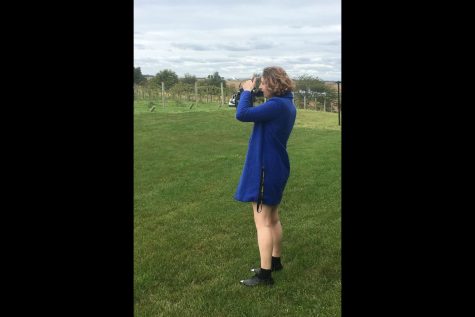
The new system has certainly worked for other students, however. Despite the obstacles that UI student filmmakers face, Bantz said he is optimistic about the adaptive power and longevity of film, even during difficult times and circumstances.
“Film is such a versatile medium that I don’t think any disaster is strong enough to stop it,” Bantz said. “Even a meteor strike would have filmmakers going outside and using the volcanic dust raining down as fog for their horror movie. As long as there’s a camera and someone to operate it, people will be making films until the sun goes out.”
Goedken, Bonner, and Bantz all urged the Iowa City community to support their filmmaking friends during this time, as well as the strong film scene that Iowa City has built and cultivated over the years. Bantz recommended following and interacting with filmmakers on their social media, such as YouTube, Instagram, and Twitter. Goedken suggested that Iowa City residents make efforts to support local films, stating that supporting filmmakers also means supporting the places that exhibit their work.
Goedken said the Bijou Film Board programs student films before all of their free screenings, which will be held every Tuesday night at 6 p.m. and Saturday nights at 10 p.m. once campus reopens.
Kluz also recommended supporting the Iowa City International Documentary Film Festival (ICDOCS), which is a UI student run film festival that exhibits the work of filmmakers from around the world. Usually, the films are shown on campus, but this year ICDOCS will be hosting the festival online from April 30 to May 2.
While UI film students have found multiple avenues to continue their study of film while social distancing, Bantz also noted that this is a perfect time for any and all Iowa City residents to take up a new creative practice, like filmmaking.
“I hope this extended time away from others encourages everybody to explore some ways they can try making films themselves,” Bantz said. “Anyone with a phone can be making films in their own house, and you don’t have to be a film student to make something valuable and creative to share with the world.”



